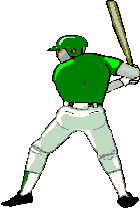by Mark Miletich


![]()


![]()
As the father of a player in Little League, it’s easy to criticize poor coaching, or what I perceive to be poor coaching. A poor coach yells at his players, argues with umpires, berates poor performance on the field, and partakes in any number of activities that are counter-productive to the performance of his players and their enjoyment of the game.
A good coach is able to “transfer”
ideas and skills to his or her players. The objective of a good coach
should be to transfer three things to the players; motivation, skills,
and morals.
MOTIVATION:
The primary objective of
a good coach should be to motivate the players to bring their “A” game
to the field every game. You know the drill: swing hard; run fast;
think about what to do with the ball if it is hit to you, before it is
hit to you. Likewise, if the coach brings his “A” game to every practice
and game, the attitude will transfer to the players, without them even
knowing it. The player won’t be swinging hard or running fast for
the coach, mom or dad in the stands, or for their teammates. They
will be doing it for themselves. There is nothing more intimidating
to play against, or pleasurable to watch, than a self motivated player.
If the coach can get the players to realize that when they do their best,
they bring out the best in their opponents, and everyone wins.
SKILLS:
A good coach is a good educator. A coach must be able to transfer knowledge to the players. For example, it is just as important to know when to steal a base as it is to know how to steal. The coach should teach his players to recognize certain situations. For example, runner on third, one out, bottom of the sixth inning, score tied, ball hit deep to the outfield but in foul territory. What do you do? You don’t catch the ball because if you do, the runner on third base will tag up and score the winning run The coach certainly isn’t going to be able to tell his outfielder this while the ball is in the air with everyone screaming in the stands.
When the coach shows a player how to perform an activity, offers suggestions on improving the technique, and gets the player to practice-practice-practice, then the player can excel at his position. The ability to transfer skills will differ for each coach. A coach can learn good skill techniques and how to teach these to his players, but these abilities alone will not lead to better coaching. The coach must also motivate his players to want to excel and practice to achieve their best.
MORALS:
To me, the most important element of a good coach is the ability to transfer the proper moral perspective on the game. When players see and hear their coach get upset when an opposing player makes a good play, the game is brought down a little bit. Every good play should be complimented, no matter who makes the play. I find it very upsetting to watch players avoid the customary hand-shake at the end of all Little League games. That should be the highlight of the game. The opportunity to congratulate your opponents on a game well played.
In all fairness (and full
disclosure) I must confess that I am an umpire. It is very bad form
for a coach to continually argue with the umpire, play after play, pitch
after pitch. It is not only against the rules, but where a coach
should be a role model for cooperation and restraint, he instead sets the
example of combativeness. Players who are exposed to poor coaching,
very often become poor coaches themselves, just as children exposed to
violence, often become abusive parents themselves. A good coach can,
and often has, been the turning point in children’s lives.
IN SUMMATION:
Taken all together, the above
three principles are incorporated into the Little League code that the
players recite before every game. The words - as if you could ever
forget them - go. . . “I will play fair, I will strive to win, but
win or lose, I will always do my best.” Now if we can just get all
of our coaches to hear those words and incorporate them into their coaching
styles, I believe that we will all be better players, parents, and people.
 Return
to Home Page
Return
to Home Page